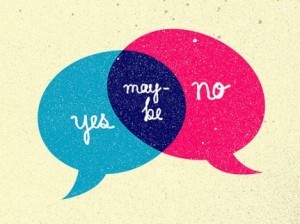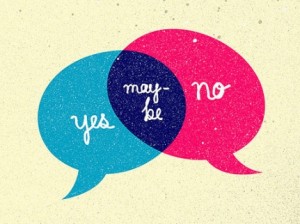Flexing Your Assertiveness
 Had it not been for commitments in both our diairies last Friday afternoon, the impromptu call I had with a radio producer on the psychology of failure could have been a pleasingly long and philosophical one. (My musing this month isn’t on the well-trodden path of fear of failure though). She’d been talking to a marine who’s bemused by civvy street’s emotional response to failure because in his world you make plans that you expect to fail. In the marines you’re taught how to respond to failure; flexibility in thought and action is at the core. This month I’m offering you greater success at work, less stress and more harmony at home when you pinpoint your ‘flex potential.’ As usual no fluff, only evidence-based flourishing techniques.
Had it not been for commitments in both our diairies last Friday afternoon, the impromptu call I had with a radio producer on the psychology of failure could have been a pleasingly long and philosophical one. (My musing this month isn’t on the well-trodden path of fear of failure though). She’d been talking to a marine who’s bemused by civvy street’s emotional response to failure because in his world you make plans that you expect to fail. In the marines you’re taught how to respond to failure; flexibility in thought and action is at the core. This month I’m offering you greater success at work, less stress and more harmony at home when you pinpoint your ‘flex potential.’ As usual no fluff, only evidence-based flourishing techniques.
Psychology professors Ben Fletcher and Karen Pine have spent a significant part of their academic life exploring behavioural flexibility and its correlates. When people are given a group of 30 behavioural dimensions and asked to pick which ones apply to them, the vast majority of people pick nowhere near 100%. It’s entirely possible to ‘own’ all 30 yet most people don’t. The thinking goes that if we don’t have all 30 behavioural dimensions in our repertoire, we haven’t got everything we need to be successful.
Professors Pine and Fletcher have written a nifty book, ‘Flex: Do Something Different,’ which includes a ‘behaviour rater’ tool and a challenge to readers to have a go at some simple actions that relate to the behaviours they didn’t tick. It’s eye-opening, great fun and many well-known organisations are using versions of the tool with their people. Flicking through my copy a year later I am reminded my biggest take-out was to be more unconventional. What I love about their work is their very practical approach and it chimes with the way I work with clients.
So, here’s a flavour. Take this pairing: assertive/unassertive. Which one do you lean more towards? If you lean more towards assertive try being more unassertive with these suggestions in the next seven days (as appropriate to the situation you’re in):
- Ignore criticism; don’t react
- Behave as if another person knows better than you
- Let someone else decide or choose something for you
- Say a lot less than you usual do
- Even when you think you know the answer, ask someone else’s opinion and see how it contrasts with your own
If you lean more to unassertive try being more assertive with these suggestions:
- Refuse a request without giving a reason or excuse
- When questioned today, be decisive in your answer even if you feel unsure
- Don’t take no for an answer today
- Speak up when normally you would hold back
- Write a short letter to your local newspaper about something that’s important to you
Karen has kindly given me three signed copies of their book ‘flex’ to give away. If you’d like one, simply drop me a line or add a comment on the blog sharing how you got on with the challenge of being more assertive or more unassertive. I’ll draw names at random.
The inspiration for this musing comes from Fletcher, B. (C) and Pine, K. J. (2012). Flex: Do Something Different. University of Hertfordshire Press.










